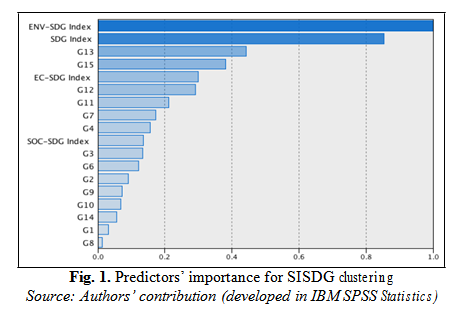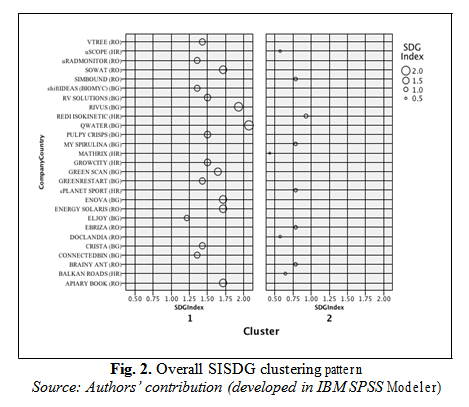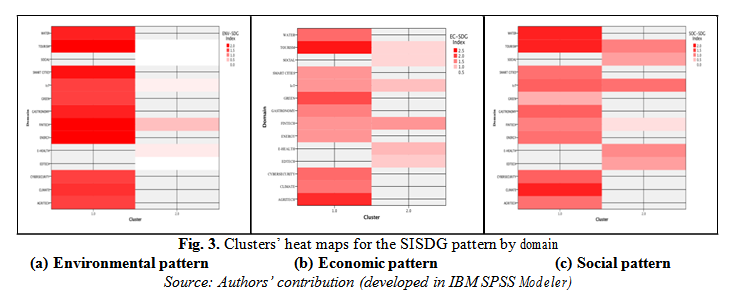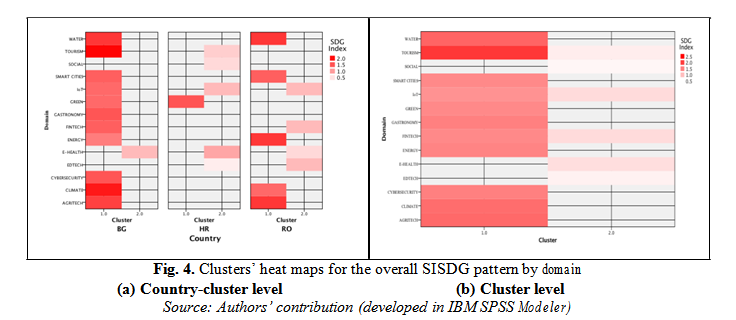Start-ups’ involvement in sustainable development: evaluation of a european case

Abstract
In times when the objectives of sustainable development should be supported by national states, companies and individuals altogether, the present research paper aims to investigate the Start-ups’ Involvement in Sustainable Development Goals (SISDG) based on the case of 27 Bulgarian, Croatian and Romanian winners of the StartUp Europe Awards 2017 competition.
The assessment of SISDG is based on two main issues: the elaboration of four innovative composite indices reflecting different facets of sustainable development (overall, economic, social, and environmental components of SD) and the application of a two-step cluster analysis for grouping the investigated start-ups. The achieved results reveal the existence of two SISDG clusters (High SISDG and Low SISDG), with different economic, social, and environmental patterns. Although mainly oriented towards including innovation, technology and efficiency catalysts in their business ventures, the start-ups also highly appreciate the social and environmental purposes and implications of their business activities.
Table of Contents:
1. Introduction
2. Review on start-ups and sustainable development
3. Research data and methodology
4. Results and interpretation
5. Conclusions and further research
1. Introduction
Today, economic growth is strictly related to social and environmental development, and the corporate contribution is not analysed anymore strictly in terms of economic and financial inputs, but also in terms of present or future potential to generate social and environmental positive externalities. As a consequence, what used to be mainly the duty of governments and national states – the broad support of sustainable development (SD) – is nowadays one of the basic requirements for companies struggling for competitive advantages and differentiation in a highly competitive global market.
Even more precise, the involvement of companies in supporting SD is not perceived as the sole responsibility of big corporations, but also the small and medium enterprises (SMEs) and the newly founded ones (start-ups) are compelled to comply with SD requirements on medium and long run. Sometimes the difference resides in the way SD concerns are approached by companies of different sizes: big corporations have the financial power to tackle them even separately from their core activities, while SMEs and start-ups consider SD objectives as a basic component of their activity [1].
Being aware of the above economic and social change, the topic of start-ups’ support for achieving the objectives of SD gains an increasing interest in recent literature ([1], [2], [3], [4], [5]). At this point, one of the major research interests is to evaluate the implication of start-ups in the three pillars of SD: economic, social, and environmental actions ([2], [6]).
Correctly assessing the SD involvement of start-ups could prove to be an efficient win-win strategy, with positive results both for the business initiatives and the society aiming to develop a wealthier, more resilient, inclusive, and clean setting. In this general framework, the research objective of the present paper is to analyse and propose an evaluation framework of SD involvement for start-ups, in order to highlight the existent trends and corresponding challenges. The investigated start-ups pertain to the European environment and were highly awarded in 2017 for their business initiatives in Romania, Bulgaria, and Croatia.
The subsequent structure of the paper is the following: the second section presents a brief theoretical and practical review on start-ups and their contribution to SD goals, the third part describes the data and methodology that we used for developing the two-step cluster analysis, the fourth part examines the main findings, and the last section addresses the conclusions.
2. Review on start-ups and sustainable development
Envisaging actions on prosperity, individuals, earth, harmony, and collaboration altogether, the United Nations sustainable development goals [7] continue addressing the issues raised by the previous Millennium Development Goals, while emphasizing the fact that the economic growth and wealth creation – which are essential for achieving these goals – are expected to come primarily from private companies [8].
In this context, the new generation of private enterprises comprises an increasing number of start-ups which aim at obtaining these sustainable development goals (SDGs), whilst providing a valuable example to other potential business initiatives. Even though the number of sustainable business initiatives is increasing yearly, there are still many economic agents that consider alignment to such goals as an expensive and inefficient investment [9] or simply not providing sufficient competitive advantage [10].
Though, available literature provides an encouraging number of experienced [11] and start- up businesses that could open more possibilities for SDGs-compliant enterprises. Start-ups examples include: I-med Vision, which developed an e-learning platform to implement comprehensive medical knowledge systems in South Africa; Pendula, which addresses the issue of circular economy and recycling in Germany; NeoTop Water Systems in Israel, which invented a system that prevents water in artificial basins from evaporating; Paperless in Bahrain, which proposes E-receipts in order to reduce paper waste; Jardim DigitaL in Brazil, providing an app that connects refugees with available jobs posted by employers; eQuality in the UK, which offer shoppers a system that allows them to edify themselves regarding the ethical, political and environmental impact of the products they purchased; or Lettuce Grow in Portugal, which provides an application that connects small farmers directly to consumers in order to enhance agricultural industry and local economy ([12], [13]).
Based on the previous examples, in terms of SDGs-compliant start-ups, there are several key aspects which define these new business enterprises. As a starting point of any new business initiative, the business plan step is an essential one, as stressed by [14] and [15].
Start-ups which include long-term sustainability in their business planning tend to become more effective on the long-run. Thus, to invest in sustainable-related processes when starting a business proves to be not a cost, but rather a long-term benefit, especially in times of fierce competition. Therefore, [14] highlight the need to encompass in future business planning the need for action in a more sustainable economic and social environment. Additionally, trying to answer the question “Why some start-ups can survive and grow, and others cannot?”, [15] return to this same starting point regarding the initial business model, which, when designed to focus on sustainability and innovation, can overcome new entry short-comings and consistently improve business performance.
Also, as emphasized by various studies ([16], [17], [18]), offering eco-products and implementing certain corporate social responsibility practices is not enough for a sustainable business; such a business should also take into consideration a wider range of stakeholder interests, including environment and society.
3. Research data and methodology
In order to achieve the previously stated research objective of investigating the start-ups’ involvement in supporting sustainable development, we aimed to group a series of well performing start-ups from Romania, Bulgaria and Croatia (the newest EU members) given their economic, social, and environmental contribution to SD.
Therefore, we selected from the entrepreneurship developer StartUp Europe Awards 2017 [19] the 12 Bulgarian (Green Scan, Rivus, RV Solutions, My Spirulina, Eljoy, CRISTA, Pulpy Crisps, shiftIDEAS-Biomyc, ConnectedBin, GreenReStart, qWater, Enova), 6 Croatian (Mathrix, ReDi Isokinetic, GrowCity, ePlanet Sport, uScope, Balkan Roads), and 9 Romanian (Apiary Book, uRADMonitor, Simbound, Doclandia, Energy Solaris, Ebriza, Brainy Ant, VTree, SOWAT) winners, totalizing a number of 27 awarded start-ups for their innovative and sustainable business ideas. Out of the 18 award-winning categories at StartUp Europe Awards 2017, the selected start-ups pertain to 14 of them: AGRITECH (2), CLIMATE (2), CYBERSECURITY (1), EDTECH (2), E-HEALTH (3), ENERGY (2), FINTECH (2), GASTRONOMY (1), GREEN (2), IoT (3), SMART CITIES (2), SOCIAL (1), TOURISM (2), and WATER (2).
According to StartUp Europe Awards (SEUA) methodology, only one start-up from each country is the winner for each category [19].
Considering our innovative assessment framework based on grades from 0 to 3, we then evaluated the start-ups’ involvement in the sustainable development goals (SDGs) proposed by [7], where: 0 represents no involvement at all, 1 is associated with low or scarce involvement, 2 is for moderate to strong involvement, and 3 denotes a very strong or excellent support for that SDG. The grading procedure and the comprehensive evaluation of start-ups’ sustainable behaviour is one original element of our research.
The 27 investigated start-ups from Bulgaria (BG), Croatia (HR) and Romania (RO) were accordingly graded for their involvement in the 17 SDGs of the [7], but only 14 goals were kept in the final analysis: G1_‘No poverty’, G2_‘Zero hunger’, G3_‘Good health and well- being’, G4_‘Quality education’, G6_‘Clean water and sanitation’, G7_‘Affordable and clean energy’, G8_‘Decent work and economic growth’, G9_‘Industry, innovation and infra- structure’, G10_‘Reduced inequalities’, G11_‘Sustainable cities and communities’, G12_‘Responsible consumption and production’, G13_‘Climate action’, G14_‘Life below water’, and G15_‘Life on land’. We eliminated G5_‘Gender equality’, G16_‘Peace, justice and strong institutions’ and G17_‘Partnerships for the goals’ considering that they are rather fulfilled by strong economic actors (like multinational corporations or national states) than by start-ups business initiatives, that only seldom may comply with this type of wide objectives.
The next stage of our research – and also one novelty contribution – was to propose and compute four indices for assessing the Start-ups’ Involvement in Sustainable Development Goals (SISDG), as average values of the rated component goals: SDG Index (an overall index reflecting all 14 SDGs), EC-SDG Index (includes the G1, G2, G8, G9, G10 and G12 economic components), SOC-SDG Index (includes the G3, G4, G6 and G11 social components), and ENV-SDG Index (includes the G7, G13, G14 and G15 environmental components). We computed these four indices for the 27 start-ups in order to further conduct the two-step cluster analysis for grouping the business initiatives by their three-folded contributions and investigating their (potential) involvement in supporting SDGs. The data normality assumption was tested through Shapiro-Wilk and Kolmogorov-Smirnov tests, revealing non-normality for the SDG environmental index. Details about descriptive statistics can be provided by authors upon request.
The indices for the three representative forms of SDG involvement (economic, social, and environmental impact) were included in the research by grouping the elements of the start-ups sample in homogeneous clusters. In support of accommodating non-normality for part of the data set, a two-step analysis ([20], [21]) was employed, that performs in a quite robust manner when the normality assumption is not confirmed ([22], [23]). Further, in terms of validity, the partition of the SDG behaviour was examined through a non-parametric method, mainly the Mann-Whitney U test. For a more detailed view on the cluster findings, the SDG overall index and the scores attained for the 14 SD goals were employed as evaluation fields. The analysis was performed through IBM SPSS (Statistics and Modeler).
4. Results and interpretation
The two-step cluster analysis, considering the Bayesian information (BIC) and Akaike’s information criteria (AIC), revealed a two-partition solution with a good quality for separation and cohesion (the silhouette measure amounts 0.6) and a fairly low ratio of sizes (of 1.7).
Fig. 1 pictures the decreasing importance of the various employed variables (the environ- mental, economic, and social SDG indices, the composite SDG index and the individual SDG scores) in discriminating between the two grouping results. Out of the three indices directly used in grouping the European awarded start-ups, the two clusters are best separated through environmental attachment towards SDGs, while the social activities related behaviour have the lowest degree in SISDG differentiating, and the economic ones have a rather medium discriminating propensity. Additionally, the overall SDG index illustrates a rather high importance in the formation of the two clusters. As for the other evaluating predictors, as expected, two environmental related scores (G13_‘Climate action’ and G15_‘Life on land’) are best at grouping the start-ups. The analysed start-ups seem to be most homogenous in terms of G8_‘Decent work and economic growth’ and G1_‘No poverty’ related engagements.

The two-segment result envisages the formation of two distinct clusters: one with a high SISDG (cluster 1-17 start-ups) and one with a low SISDG (cluster 2-10 start-ups), as indicated by the mean values of the four SDG indices in Table 1. Moreover, two different patterns of start-ups’ SDG involvement are revealed by the average values of the indices within the two groups: in first cluster, the environmental component is the strongest, followed closely by the economic one, while the social dimension brings in the lowest contribution; in second cluster, the highest contribution is triggered by the economic component, followed closely by the social one, and at high distance from the lowest environmental contributor.

This inference is also stressed by the overall SISDG clustering pattern through the position of the SDG Index value for each start-up within the corresponding cluster in Fig. 2.

In Fig. 3, the cluster configuration of the three SDG indices (ENV-SDG, EC-SDG, SOC- SDG) for each StartUp Europe Awards domain reveals: a clear distinction between clusters for each domain in terms of environmental achievements, with a definitely better performance within cluster 1, in Fig. 3(a); a rather slight delineation among the SISDG clusters considering the economic attainments, in Fig. 3(b); and a rather homogenous structure of the clusters for the social accomplishments in Fig. 3(c). The best performing domain for all SDG components seems to be Tourism, followed by Water, Climate and Energy, while the lowest in terms of SDG are companies from the Social, E-Health or EdTech domains.

At country level, Fig. 4(a) reveals that start-ups from Bulgaria are SDG leaders, only one company from E-Health pertaining to the second cluster. Oppositely, the awarded start-ups from Croatia, except for the one included in the Green domain, are all contained within the second cluster. The analysed start-ups’ sample from Romania seems to display a middle path, with more than half of the companies (5 out of 9) included in the first cluster, and Water, Energy and Agritech companies having the highest SDG achievements.

At cluster level, in Fig. 4(b), the overall SDG performance for the Tourism awarded start- ups is the highest within cluster 1 and as a differentiator between clusters. The lowest achievers pertain to the Social, E-Health and EdTech awarding domains, and they are present only in the second cluster. Furthermore, awarded start-ups for IoT and Fintech seem to be slightly homogenous in terms of SDG between the two groups.
When investigating from the perspective of the support allocated by the 27 start-ups to the 14 SDGs, the preferred goal is G9_‘Industry, innovation and infrastructure’ (2.44 points out of maximum 3), followed by G8_‘Decent work and economic growth’ (2.07 points) and G12_‘Responsible consumption and production’ (1.96 points). All these three goals are of economic nature and they show the highest propensity of start-ups for mainly searching for solutions to sustainably improve their economic performance. The lowest average values were achieved for G14_‘Life below water’ (0.37 points out of 3), G10_‘Reduced inequalities’ (0.56 points), G1_‘No poverty’ and G6_‘Clean water and sanitation’ (0.59 points each), partially due to the specificity of the domain (G6, G14) or the global nature of the problem (G1, G10).
5. Conclusions and further research
The explored Bulgarian, Croatian and Romanian start-ups awarded by SEUA 2017 are including SD objectives and considerations in their daily operations, currently showing that a good business performance primarily depends on providing innovative products or services that are inherently based on social and/or environmental concerns. Without aiming to generally extrapolate the achieved results, our research revealed that the economic component of SD is the most supported when analysing the overall start-ups’ involvement in sustainable development goals (SISDG), while the environmental component of SD is the one that most differentiates between high and low performing SISDG.
The cluster solution facilitated the comprehension of the analysed SISDG: the overall SISDG unequivocally discriminates among the two groups; the majority of the sample exhibits propensity towards high involve- ment in SDG; and the clusters reveal that there is a distinct separation among start-ups in terms of environmental involvement, and rather similarity regarding their social engagement.
The Bulgarian start-up ventures proved to be the SDG leaders, due to their consideration of multiple SDGs altogether; at the opposite end, the Croatian start-ups displayed a more focused orientation, preferring to concentrate on more specific products or services. In terms of SEUA 2017 domains, the Tourism sector was best represented through start-ups’ support for SDG, while Social and EdTech fields benefited of a much lower support. The analysis at SDGs’ level also highlighted the main consideration of economic dimensions, reaffirming the for-profit orientation of the investigated business initiatives, which are more familiar with the inclusion of operational and/or industrial innovations in their objects of activity.
Although having a high novelty degree – mainly emphasized by the method of grading and assessing the start-ups’ involvement in supporting the SDGs – the present research could be further developed by including a higher number of start-ups from more countries, in order to test if the identified pattern remains the same or it is peculiar to the investigated start-ups’ in the newest EU member countries. Besides, a correlation between SISDG and their financial performance would be of great interest, if data is available. The results of such a correlation would strengthen even more the need for SISDG or would come in line with the sceptics’ position regarding the costs of supporting SD by start-ups. The best performing start-ups on the business arena are also properly considering the requirements of sustainable development.
Contributo selezionato da Filodiritto tra quelli pubblicati nei Proceedings “International E-Conference Enterprises in the Global Economy - 2018”
Per acquistare i Proceedings clicca qui.
Contribution selected by Filodiritto among those published in the Proceedings “International E-Conference Enterprises in the Global Economy - 2018”
To buy the Proceedings click here.



